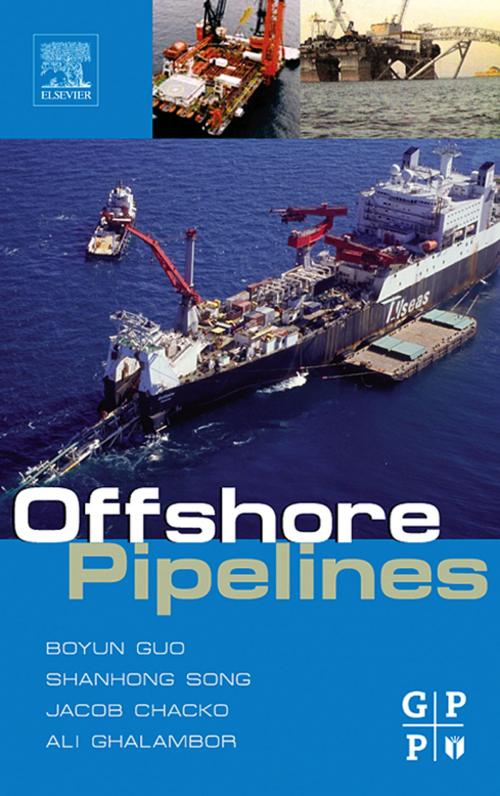Offshore Pipelines
Nonfiction, Science & Nature, Technology, Petroleum, Business & Finance, Industries & Professions, Industries| Author: | Tian Ran Lin, PhD, Shanhong Song, Ph.D., Ali Ghalambor, PhD, Jacob Chacko, Boyun Guo | ISBN: | 9780080456904 |
| Publisher: | Elsevier Science | Publication: | April 25, 2005 |
| Imprint: | Gulf Professional Publishing | Language: | English |
| Author: | Tian Ran Lin, PhD, Shanhong Song, Ph.D., Ali Ghalambor, PhD, Jacob Chacko, Boyun Guo |
| ISBN: | 9780080456904 |
| Publisher: | Elsevier Science |
| Publication: | April 25, 2005 |
| Imprint: | Gulf Professional Publishing |
| Language: | English |
Offshore Pipelines covers the full scope of pipeline development from pipeline designing, installing, and testing to operating. It gathers the authors' experiences gained through years of designing, installing, testing, and operating submarine pipelines. The aim is to provide engineers and management personnel a guideline to achieve cost-effective management in their offshore and deepwater pipeline development and operations.
The book is organized into three parts. Part I presents design practices used in developing submarine oil and gas pipelines and risers. Contents of this part include selection of pipe size, coating, and insulation. Part II provides guidelines for pipeline installations. It focuses on controlling bending stresses and pipe stability during laying pipelines. Part III deals with problems that occur during pipeline operations. Topics covered include pipeline testing and commissioning, flow assurance engineering, and pigging operations.
This book is written primarily for new and experienced engineers and management personnel who work on oil and gas pipelines in offshore and deepwater. It can also be used as a reference for college students of undergraduate and graduate levels in Ocean Engineering, Mechanical Engineering, and Petroleum Engineering.
* Pipeline design engineers will learn how to design low-cost pipelines allowing long-term operability and safety.
* Pipeline operation engineers and management personnel will learn how to operate their pipeline systems in a cost effective manner.
* Deepwater pipelining is a new technology developed in the past ten years and growing quickly.
Offshore Pipelines covers the full scope of pipeline development from pipeline designing, installing, and testing to operating. It gathers the authors' experiences gained through years of designing, installing, testing, and operating submarine pipelines. The aim is to provide engineers and management personnel a guideline to achieve cost-effective management in their offshore and deepwater pipeline development and operations.
The book is organized into three parts. Part I presents design practices used in developing submarine oil and gas pipelines and risers. Contents of this part include selection of pipe size, coating, and insulation. Part II provides guidelines for pipeline installations. It focuses on controlling bending stresses and pipe stability during laying pipelines. Part III deals with problems that occur during pipeline operations. Topics covered include pipeline testing and commissioning, flow assurance engineering, and pigging operations.
This book is written primarily for new and experienced engineers and management personnel who work on oil and gas pipelines in offshore and deepwater. It can also be used as a reference for college students of undergraduate and graduate levels in Ocean Engineering, Mechanical Engineering, and Petroleum Engineering.
* Pipeline design engineers will learn how to design low-cost pipelines allowing long-term operability and safety.
* Pipeline operation engineers and management personnel will learn how to operate their pipeline systems in a cost effective manner.
* Deepwater pipelining is a new technology developed in the past ten years and growing quickly.















